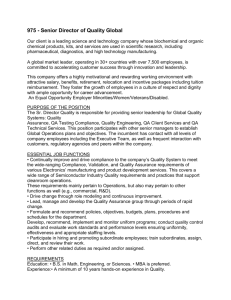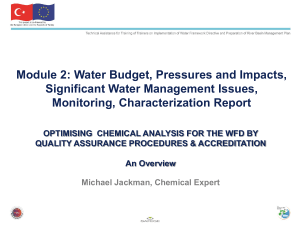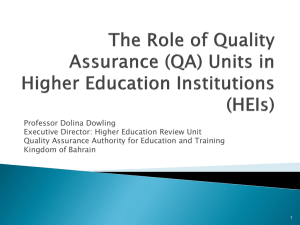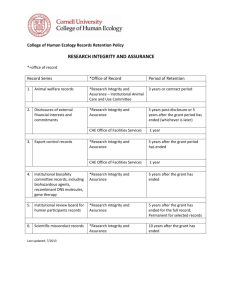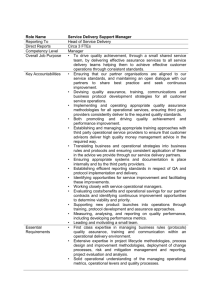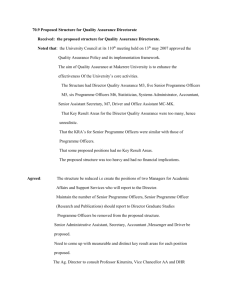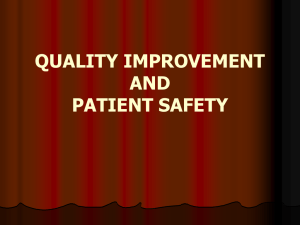6 - City of Cape Town
advertisement
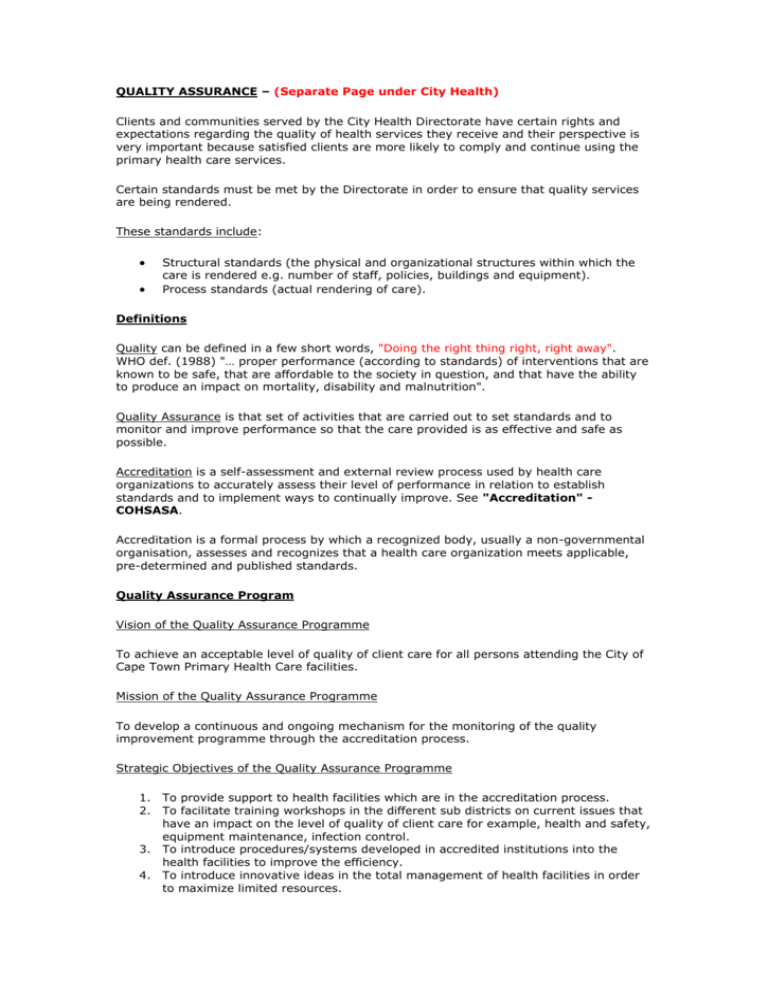
QUALITY ASSURANCE – (Separate Page under City Health) Clients and communities served by the City Health Directorate have certain rights and expectations regarding the quality of health services they receive and their perspective is very important because satisfied clients are more likely to comply and continue using the primary health care services. Certain standards must be met by the Directorate in order to ensure that quality services are being rendered. These standards include: Structural standards (the physical and organizational structures within which the care is rendered e.g. number of staff, policies, buildings and equipment). Process standards (actual rendering of care). Definitions Quality can be defined in a few short words, "Doing the right thing right, right away". WHO def. (1988) "… proper performance (according to standards) of interventions that are known to be safe, that are affordable to the society in question, and that have the ability to produce an impact on mortality, disability and malnutrition". Quality Assurance is that set of activities that are carried out to set standards and to monitor and improve performance so that the care provided is as effective and safe as possible. Accreditation is a self-assessment and external review process used by health care organizations to accurately assess their level of performance in relation to establish standards and to implement ways to continually improve. See "Accreditation" COHSASA. Accreditation is a formal process by which a recognized body, usually a non-governmental organisation, assesses and recognizes that a health care organization meets applicable, pre-determined and published standards. Quality Assurance Program Vision of the Quality Assurance Programme To achieve an acceptable level of quality of client care for all persons attending the City of Cape Town Primary Health Care facilities. Mission of the Quality Assurance Programme To develop a continuous and ongoing mechanism for the monitoring of the quality improvement programme through the accreditation process. Strategic Objectives of the Quality Assurance Programme 1. To provide support to health facilities which are in the accreditation process. 2. To facilitate training workshops in the different sub districts on current issues that have an impact on the level of quality of client care for example, health and safety, equipment maintenance, infection control. 3. To introduce procedures/systems developed in accredited institutions into the health facilities to improve the efficiency. 4. To introduce innovative ideas in the total management of health facilities in order to maximize limited resources. 5. To provide support to the remaining health facilities entering the accreditation programme in the next phase. Quality Assurance as a function of Specialised Services Aim: To improve the quality of health services to the public. In order to achieve this aim the City Health Directorate introduced a Quality Assurance Programme in 2000 (clinics and environmental health offices). The intent is to gradually roll-out the programme and accreditation to all facilities within the Health Directorate. The programme is run in collaboration with the Council for Health Services Accreditation of Southern Africa (COHSASA) who will assist with the training of staff, facilitation of the programme, external surveys, accreditation of facilities and maintenance of accredited facilities. The Quality Assurance Programme and continued quality improvement is also monitored via the Health Directorate Business Plan as well as the Balance Scorecard System (check monthly and quarterly reports via Sub District Managers). Facilities accredited enter a maintenance programme and must adhere to the Quality Assurance Maintenance Programme. The following is a description of the different phases of the Quality Assurance Accreditation Programme, which lasts approximately two years. Quality Assurance Maintenance Program Introduction Health care in the 21st century will require a new kind of health professional: someone who is equipped to transcend the traditional health professional/patient relationship to reach a new level of partnership with patients; someone who can lead; manage and work effectively in a team and organizational environment, someone who can practice safe, high quality care but also constantly see and create the opportunities for improvement. Quality forms an integral part of the City of Cape Town's philosophy and raptures commitment to leadership from the top; empowerment of staff and teamwork, prevention of adverse outcomes, analyzing, simplifying and improving process and strong customer focus. General All facilities that have been accredited must ensure that a Quality Assurance Maintenance Programme is introduced immediately after accreditation in order to maintain the high standards achieved and to qualify for re-accreditation in 2/3 years. Role of the Clinic Manager and Principle Environmental Health Practitioner 1. Monitor OBJECTIVE and ACTION PLAN IMPLEMENTATION continuously. 2. Monitor EXISTING QUALITY ASSURANCE PROJECTS and initiate new projects. 3. Ensure that STEERING COMMITTEE continues to meet monthly. Minutes to be kept - copy to Sub District Manager and Area Manager. 4. HEALTH AND SAFETY o Ensure that Health and Safety programme is implemented and attended to. o Monitor Health and Safety representative inspections/audits and that corrective action is taken. 5. INFECTION CONTROL o Ensure that Infection Control Policy is correctly implemented. o Ensure that facility Infection Control committee meets and that problems are identified and correctly addressed. o Infection Control Training needs of all staff must be identified and addressed. o Infection Control Audit must be done monthly by the Facility Manager or delegated staff member in charge of Infection Control. o Feedback re: audit must be given to all staff, followed by corrective action, training and evaluation. Use feedback checklist and keep records. 6. HOUSEKEEPING o Ensure that policies relevant to housekeeping are adhered to eg. Infection Control Policy and Health and Safety Policy. o Complete checklist on a monthly basis, discuss problems, implement corrective action and document. 7. RESUSCITATION o Resuscitation equipment must be checked daily by the Clinic Manager or delegated person and record kept. o Ensure training of all staff and 2 yearly updates in CPR as required. 8. NON-COMPLIANT AREAS o Non-compliant areas identified must be corrected and documentation kept of correction action. 9. QUESTIONNAIRE for Facility Managers (Annexure I) to be completed on a monthly basis and discussed with immediate line manager. The Quality Assurance Team The Quality Assurance Team consists of the Manager Quality Assurance and relevant Sub District Managers, Area Managers, PEHP's and the Manager: Administration. Role Of Quality Assurance Team The Team will visit facilities on an annual basis and do a mock external survey of certain criteria as predetermined by the team.
